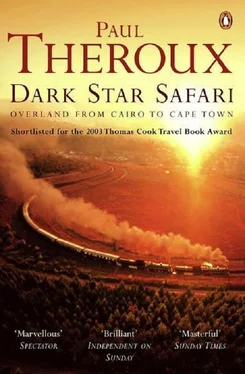‘By breaking down, I mean we hit a donkey and he flew through the windscreen and died in the driver’s lap, and some Boers on the bus said, “Aye, let’s have a braai and grill the bastard and eat ’im” — can you imagine?’
In Conor’s Dublin brogue this was a marvelous manic lilting sentence.
Instead of barbecuing the dead donkey they pressed on to Chinhoyi, where they got stranded again. ‘No one had Zim dollars, so we were really up a tree. We gave up in Harare and just flew home to Cape Town, bugger the buses. How about you?’
I summarized my progress from southern Tanzania but my conclusion was bugger the buses, too. I said I preferred the trains, especially the Trans-Karoo Express.
‘We were on the Karoo two weeks ago for a weekend,’ Conor said, getting up from his chair so that he could fling his illustrating arms around in precise Irish gestures. ‘A little hotel run by a gay couple. We reckoned on a little hiking in the hills, good food and a bit of rest. Jaysus, it turned out to be a nightmare, from the moment we arrived — Kelli, her mum, and me. I said, “Let’s watch the football in the bar.” It was one of those strange Afrikaner bars, a lot of drunken farmers on a Saturday afternoon. The barman was weird, too — he had been a soldier in Angola and was half-mental because of it. Some blacks in the corner, looking unwelcome. Anyway, I switches on the telly and a big drunken farmer lurches over and looks me in eye.’
Imitating the lurching farmer Conor goggled into my eye.
‘Football’s a kaffir sport. Either watch the fucking rugby or turn it off! No fucking kaffir sports in this bar!’
‘We’d only been there five minutes, see. Anyway, he went on yelling at us because I wouldn’t turn the telly off. Then the farmer said, “Look, he’s a kaffir!” — and he hugged one of the blacks in the corner who looked horribly embarrassed — “though he’s my friend, my kaffir friend.” He goes on, “But these bloody people are making us suffer. Nine hundred and fifty farmers have been murdered since ’94!”As he said it, Kelli — who’s pretty impatient, as you know — put her hand over her mouth and pretended to yawn.
‘The Boer went ballistic! He made a lunge for Kelli, and I tried to grab him.
‘Then the barman — well, the barman must have done some pretty strange things in Angola, because he was really mental, I mean, he showed us his paintings later. You should have seen them, like some Vietnam vet with post-traumatic stress. They were really upsetting. The barman starts saying, “ Nie vrou! Nie vrou! She’s a woman, you can’t hit a woman!”
‘But the crazed Afrikaner was trying to hit Kelli with a pool cue and I was trying to drag him down, and me mother-in-law is screaming and the telly is too loud.
‘The mental barman went ballistic too, just as one of the gay guys comes in and says, “What is the matter?” And that was the awful part, because the Boer was bellowing in Afrikaans, “Shit! Fuck! Kaffirs!” and missed Kelli and hit the gay guy in the face with the pool cue.
‘The gay guy began to cry. The barman vaulted over the bar and hauled him off and went boof ! — right in the Boer’s chest, and down he went. As he settled on the floor we ran upstairs.’
‘That’s an amazing story,’ I said, laughing, because Conor had acted it out in the center of the parlor, with the wind snarling and pressing at the windows.
‘It wasn’t over!’ he said. ‘When we were in our room we heard him climbing the stairs.’
Conor imitated a Frankenstein-like stumping up the stairs and along the corridor of the inn, and the Boer’s growling, ‘I’ll kill ya! I’ll kill ya!’
‘I locked the door, but just to be sure I took a chair. I thought: I’ll break it over his head. I heard him start to bellow, “I know where you are!” and still he was banging all over the place. But he didn’t find us.
‘That was the first forty-five minutes of our weekend on the Karoo. I’ll tell you the rest some other time. Have a beer. Cheers. Some people are coming. I forgot to tell you this is our going-away party. We’re leaving tomorrow.’
The guests arrived for the party, multi-hued, a cross section of Cape Town. We drank and they told more stories. I felt I had fallen among friends. I felt close to Conor and Kelli, who knew the tortuous route through East and Central Africa. But they saw no future for themselves here. They were going back to San Francisco, where they had green cards and jobs.
For a few days in Cape Town I did what tourists do. I took a day trip to the wine lands of Franschoek and Paarl and Stellenbosch; looked at the vineyards and the cellars; went to wine tastings. I spent a morning at Constantia and an afternoon on the eastern slopes of Table Mountain, at the national botanical garden, Kirstenbosch, a lush repository of South African plants, filled with succulents and cycads and palms, as well as the fragrant varieties of low bush called fynbos , that was peculiar to the purple moorlands of the Cape. A boundary hedge, planted by Jan van Riebeeck in 1660, was still flourishing at the margin of Kirstenbosch.
One day intending to take the train to Simonstown I went to the station but got there too late for that. However, I was on time for another train, to Khayelitsha. I was in the mood for any train. Unable to find Khayelitsha on my map, I went to the information counter and inquired as to its whereabouts. The clerk, a young affable man of mixed race, showed me the place on the map.
Then he leaned across the counter and smiled and said, ‘Don’t go there.’
‘Why not?’
‘It’s too dangerous,’ he said. ‘Don’t go.’
‘I’m just taking the train. How is that dangerous?’
‘The train was stoned yesterday,’ he said.
‘How do you know it will be stoned today?’
He had a beautiful smile. He knew he was dealing with an ignorant alien. He said, ‘The train is stoned every day.’
‘Who does it? Young kids?’
He said, ‘Young, old, lots of people. From the town. They’re not playing. They’re angry. And they do a lot of damage. How do I know? Because yesterday I was on the train to Khayelitsha. With my friend — he’s the driver. We were in the driver’s cab. When the stones came he was hit in the side of the face. He was all bloody. Listen, he’s in the hospital. He’s in rough shape. He was just doing his job.’
This convinced me. I decided not to go to Khayelitsha and told him so. The clerk’s name was Andy. We talked a while longer. Khayelitsha in Xhosa meant ‘Our New Home,’ and there were 700,000 people there, most of them living in shacks, on the Cape Flats.
While we talked, another clerk sat rocking back in a chair, a big middle-aged African woman in a thick red sweater and a wool hat, with her feet propped against the counter, just out of earshot. She was staring straight ahead and fiddling absently with a scrap of paper.
‘I’m not a racist,’ Andy said. ‘But the blacks in this country think they are being passed over for jobs. In places like Khayelitsha they have no jobs — no money. They thought that after apartheid they would get jobs. When it didn’t happen they began to get wild.’
‘I wanted to see a squatter camp.’
‘No,’ Andy said, smiling, shaking his head at the madness of it, and reminding me of all the times I had heard, There are bad people there . ‘Don’t go to a squatter camp. Don’t go to a black township. You’ll get robbed, or worse.’
The next day I went to a squatter camp. It was called New Rest, 1200 shacks that had been accumulating for a decade on the sandy infertile soil of Cape Flats beside the highway that led to the airport. The 8500 inhabitants lived mainly in squalor. It was dire but not unspeakable. There was no running water, there were no lights, nor any trees; there was only the cold wind. I never got to Cape Town International Airport, but I could just imagine travelers arriving and heading up the highway and looking at this grotesque settlement from the taxi window and saying to the driver, ‘Do people actually live there?’
Читать дальше












